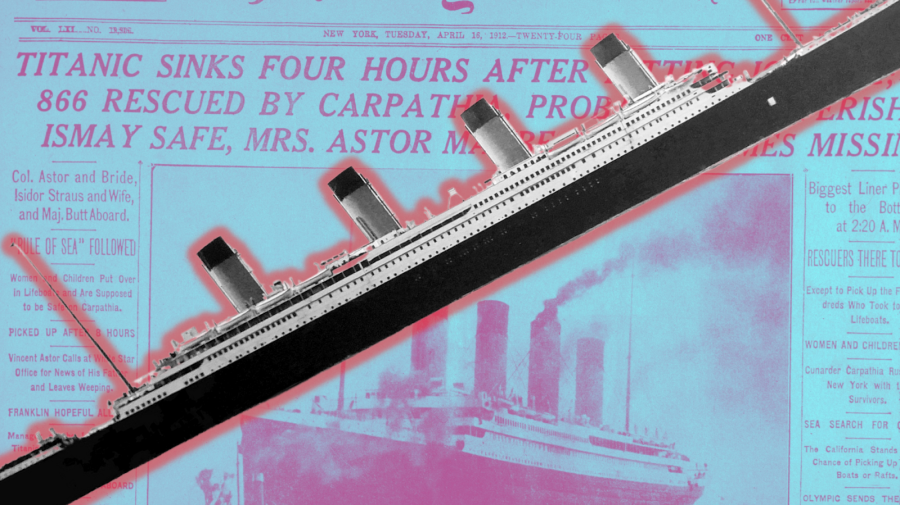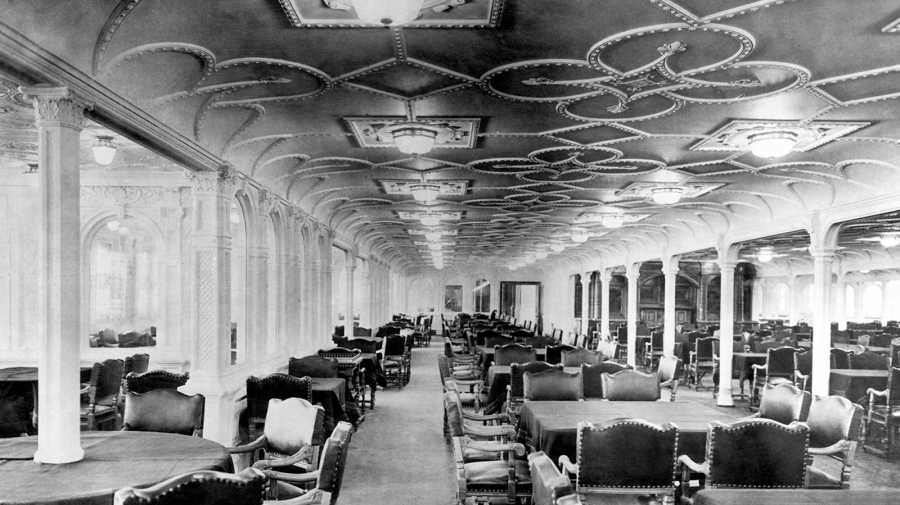The Horror Stories Behind Songs People Never Want to Hear Again

The sinking of The RMS Titanic is, without a doubtfulness, one of the defining events of the 20th century. Most immediately, the story captured the attention of people effectually the world. It's a story of hubris ("The boat is unsinkable," said Philip Franklin, vice president of White Star Line in 1912), but it's also a story of sacrifice and heroism (Major Archibald Butt, for example, and countless others died helping others survive).
Songs have been a major role of the cultural experience and remembrance of the Titanic. The tragedy has been immortalized in song numerous times over the 110 years since the ship's sinking. From Leadbelly's "The Titanic," to Blind Willie Johnson's "God Moves on the Water," to Bob Dylan's much more contemporary "Tempest," the famous sunken ship is an irresistible subject field.
There are other musical associations: Celine Dion'due south megahit, "My Eye Will Get On," from the soundtrack to James Cameron's 1997 blockbuster, Titanic, and the hymn, "Nearer My God to Thee," which was famously the alleged last song played by the band on the ship itself. Simply the song that is mayhap most closely associated with the tragic event is a tune that's thought to take been written past William and Versey Smith, a husband and wife religious dejection duo from either Texas or The Carolinas. Chosen "When That Bully Ship Went Down," it's been covered and performed by endless musicians and summertime camp attendees over the past century or and then — merely why?
Attitudes Nigh the Sinking Ship

There was, of course, a groovy bargain of mourning post-obit the news that the "unsinkable" ship had, in fact, sunk. The loss of life was staggering; over 1500 people died — far more than than survived. For Black Americans, there was some irony hither. William and Versey Smith's 1927 recording of "When That Cracking Send Went Down" is featured in the famous 1952 Harry Smith Anthology of American Folk Music, and the liner notes explain that Black musicians "found it noteworthy and ironic that company policies had kept Black [people] from the doomed ship; the sinking was also attributed past some to divine retribution."
Divine retribution or not, every bit Henry Louis Gates points out, statements like the ane in the Washington Post from 1912 — that much of the sadness of the tragedy was due to "the character and importance of many of those who sank" — landed such that they "practically dared African Americans to insert themselves into the Titanic narrative." In fact, at that place was a Black man on the Titanic, Joseph Laroche, whose story is interesting in and of itself, but that wouldn't be widely known until much, much subsequently.
Myth and History
In the moment, Black Americans attempted to situate themselves in the story through myth and commentary. Gates describes the popular rumors of the 24-hour interval, ane of them that the famous boxer Jack Johnson had tried to lath the Titanic but was refused entry because of the color of his peel (this myth was immortalized in the Leadbelly song mentioned above).
Ballads like Leadbelly'south and the one by William and Versey Smith were another way for Black Americans, suffering and then many tragedies of their own, to comment on their absence from this detail case of cultural mourning. During the earlier era of slavery, as Kenyatta D. Drupe points out, "Music was a mode for [enslaved people] to limited their feelings whether it was sorrow, joy, inspiration or hope." This tradition of expression through music is a key role of the experience of Black ballads about the Titanic, specially "When That Great Ship Went Down."
Singing in Sadness

The idea that singing might be a way to cope with sadness should probably exist no nifty revelation, just it can feel a little jarring when you're singing and then realize what's going on in the words you lot're proverb. The famous chorus of "When That Neat Transport Went Downwards" goes: "It was sorry when that corking transport went down / It was sad when that swell ship went downward / Husbands and wives and little children lost their lives / Information technology was sad when that great ship went downward."
If that feels distasteful to you, I can't quite arraign you, but I've always felt a kind of rush in the disconnect betwixt the meaning of the words and the feeling of the song. To sing such devastating truth so joyously is, peradventure, a little cathartic — a way of taking back a niggling power in the face up of a universe that can seem roughshod sometimes.
I recently wrote nearly National Poetry Month that sometimes poetry can deliver information you lot didn't know y'all needed. Information technology is much the aforementioned with songs; it tin can exist tempting to think that it'southward the words themselves that contain the information, just that'due south not the whole truth. How we feel is a mysterious combination of the words, the sounds, and what's already in our hearts.
Source: https://www.ask.com/culture/story-of-the-song-titanic?utm_content=params%3Ao%3D740004%26ad%3DdirN%26qo%3DserpIndex
0 Response to "The Horror Stories Behind Songs People Never Want to Hear Again"
Post a Comment